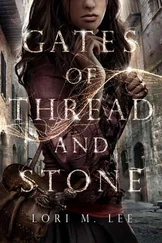She was not sure to whom she belonged. She hardly knew Alexander Medvedev, the man she supposed to be her father, and she saw little of her mother. Marina loved her mother, whom she remembers as a wistful-looking woman and very loving. But Klavdia was away all day at work, her health was frail, and much of her time at home was devoted to the new baby. She loved her bright and pretty little daughter and called her a “wunderkind.” But even in her mother’s behavior, there was something that made Marina feel different.
Afterward, long afterward, Klavdia was to say to her: “If I had known what you were going to grow up into, I wouldn’t have taken such good care of you. I’d have just let you die.”
In the early spring of 1947, Alexander Medvedev appeared in Marina’s life again. He left Murmansk, came to Archangel, and then he and Klavdia went away, evidently in search of a job. When they returned a few weeks later, they had found one in Moldavia, over a thousand miles from Archangel. They packed their belongings, got Marina and Petya ready for the long journey, and said their goodbyes. It was the beginning of their life together as a family.
Tucked between Rumania and the Ukraine, in the southwestern corner of the USSR, Moldavia was then a primitive agricultural area. Most of the countryside still had no electric power or light. It appeared quite natural and in the order of things that Alexander, a skilled electrical technician, should have found a job in the tiny village of Zguritsa setting up an electric power station.
With its mild winters; long, hot summers; and fertile black earth, Moldavia was one of the richest sections of the Soviet Union. Taken over from Rumania on the eve of the war and quickly overrun by the Germans, it had not yet been organized into collective farms. The peasants were free to buy up land, to till their own soil, and hawk their produce to the highest bidder at the bazaar. Private initiative flourished and with it the countryside. Wartime rationing was still in force, but food was plentiful. Marina’s mother used to say that they went to Moldavia “to eat our fill” after the rigors of war.
There may, however, have been another reason the Medvedevs went to such an out-of-the-way place as Moldavia. Marina later recalled something she scarcely noticed at the time. Countless wives and children of political prisoners were in rural Moldavia, trying to blend in to the landscape and hoping the authorities would lose sight of them. Apparently, Alexander, too, was in trouble and in need of a quiet spot where he could wait for the dust of disgrace to settle. Marina recalls that her stepfather had snipped the officer’s insignia off his uniform and seldom spoke of his years in the army. When he did, it was to describe the terror he felt in shooting his first German and the psychological attacks that had caused his hair to go gray. She surmises that he must have committed some offense, such as a self-inflicted wound or refusal to obey an order, for which he had been broken in rank, sentenced to serve in a penal battalion in Murmansk, discharged in dishonor, and then required to “disappear” in a rural backwater for five years or so. It was a frequent form of punishment in the Soviet Union.
The family made the five-day journey by train to the Moldavian border, then by horse-drawn cart, over muddy roads, to the tiny village of Zguritsa. They set up housekeeping in a single rented room in a thatched, one-story farmhouse. The walls, the floor, and the yard outside were of clay. Sweet-smelling grass covered the floor and, over it, a rug woven with the bright geometric designs favored by the Moldavians. The walls were covered with native rugs, too, and the room was heated by an old stove, fed with a rapidly burning peat made from sunflower seeds. In the yard there were an outhouse and a shed for corn and hay, which also sheltered an old sow and her litter. Whenever Alexander wasn’t looking, Marina rode the sow around the yard, her legs sticking straight out at the sides.
She came to love Zguritsa. She loved watching the birds glide over the low hills and the trees. She loved the fields of tall grass and wildflowers, dotted with white acacias and fruit trees of every variety. She liked the pungent aroma of smoking fuel from the outdoor stoves that had been dug into the ground in nearly every yard to use when it was too hot to cook indoors. It was the special smell of straw and cow manure. She loved going with her mother to the bazaar in the center of town where the Moldavians in colorful native costumes spread their rugs on the ground and sold live chickens and geese, cackling ducks and turkeys, goats and the sheep cheese called Brynza, milk, melons, and butter, grapes and other fruit of all kinds, corn, wine, and sunflower oil, and herbs that could cure any illness. It was a noisy spectacle, loud with the sounds of pigs screeching and hawkers trying to outshout one another.
Moldavia, unlike Archangel with its cold and rigorous climate, was a place where Marina could spend most of her time out of doors. One of her favorite games was suggested by the Tarzan films that had been captured by the Russian armies in Germany and were being shown all over the Soviet Union. After the movie was over, Marina and her friends would race to the orchards that studded the village and hang from the trees screeching: “Me Tarzan, you Jane!” The Tarzan-boys, in noisy pursuit of the Jane-girls, would run from orchard to orchard, stealing apricots and cherries and apples and devouring them whether they were ripe or green. The children tied ropes to the trees and spent whole days swinging back and forth like their hero.
A summer’s day seldom went by without Marina and her playmates spending hours splashing in the river, the muddy, meandering Kainar. They wore undershirts which had been resewn at the bottom by their mothers into the shape of modest one-piece bathing suits. In the river they would cover themselves with mud from head to toe to look like Negroes—an exotic race that they had heard about but never seen. Another pastime was exploring the meadow on the far side of the river where the gypsies had come to camp. There they found children dirtier than any they had ever seen before, and the music of drumbeats could be heard day and night. Of all the inhabitants of Zguritsa—Ukrainians, Moldavians, Russians, Jews—the gypsies were the most notorious. None of them worked; they made their living by stealing. Plainly, they did not think that Marx’s commandment—“He who does not work shall not eat”—applied to them. The Soviet authorities thought otherwise. In an attempt to tame the gypsies, the militia descended upon them and took away the internal passports of the few who happened to possess them. No longer were the gypsies free to steal anything they could lay their hands on, then slip away under cover of darkness to another campsite. From now on, it was thought, they would stay in one spot and work. But the gypsies went on living exactly as before. In Zguritsa, it seemed, not even pigs and horses were safe from the gypsy stealth.
In the postwar effort to clean up the loose ends of Soviet society, the gypsies were by no means the only ones whom the authorities attempted to chasten. A few months after the Medvedevs came to Moldavia, in December 1947, the government devalued the currency in a sudden move to combat inflation before wartime rationing was ended. It was the peasants in places like Moldavia who were hardest hit. They had been free during the war to produce all the food they could and sell it on the open market. They had profited from the war and kept their bundles of rubles not in the banks but in their mattresses or some other spot at home where they thought they would be safe from confiscation. But now the old rubles had no value. The peasants were forced to turn them in at the rate of ten old rubles for one new one. Hardworking, industrious farmers were wiped out overnight. There was literally wailing and gnashing of teeth.
Читать дальше











